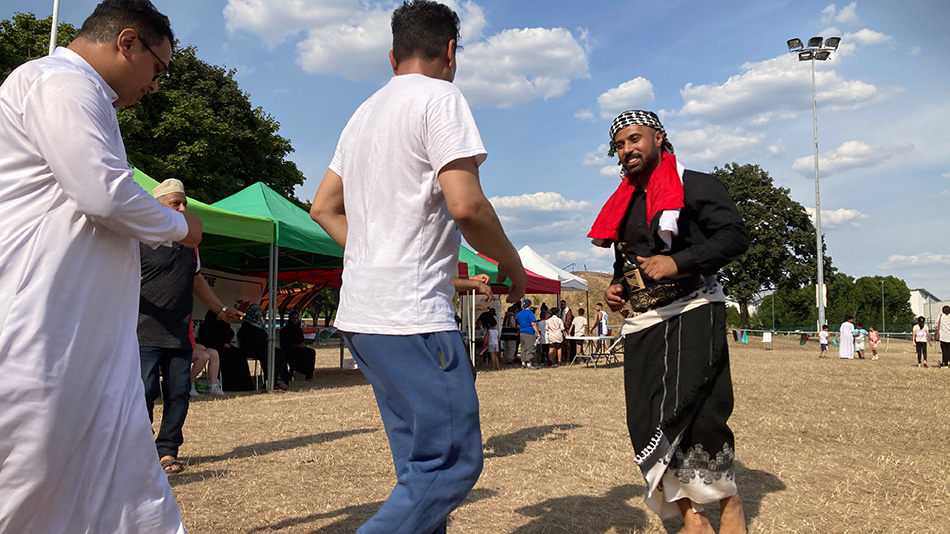With such a historic presence in Wales, how have Yemeni-founded groups branched out into the wider community, and how much does identity play a role?
Under the fierce sun of a mid-august heatwave, Yemeni music beats out loudly from large speakers. Men dressed in a mix of summer wear, long kaftans and Arabic head dresses dance in a circle on the sun-bleached, golden, dusty grass. Under gazebos, sheltered from the heat, women in burkas sit with their children, while others sell cakes and sweets.
Despite the heat, music and traditional clothing, this is not the Arabic peninsula, this festival was being celebrated closer to the River Severn than the Gulf of Oman, in Pillgwennly, Newport. Organised by the Newport Yemeni Community Association (NYCA), the Welsh-Yemeni festival showcases the coming together of Welsh culture, with one of Wales’s oldest diaspora communities, the Yemenis, through elements including classic Welsh choirs to traditional Yemeni dancing.
Reggie Al-Haddi is the NYCA chairman and festival organiser, he sees the event as a way for the young generation to celebrate their community, “they have the Welsh heritage, and they also have a Yemeni heritage, so that was important to celebrate those two… we wanted to bring that together and say, we want you to have the best of both worlds.”
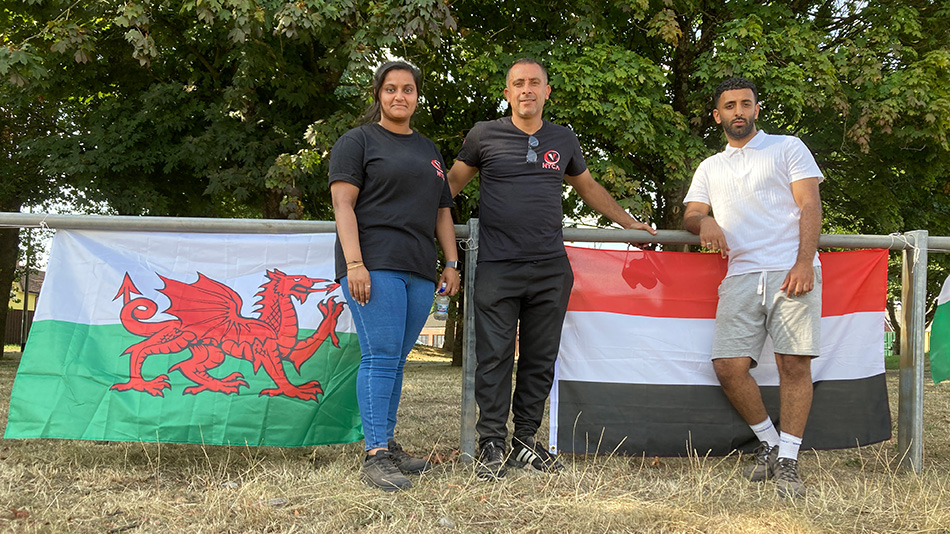
The NYCA is just one of the many Yemeni founded groups across Britain. Since Yemeni seamen began calling Wales home in the 19th century, the community has had a notable presence across the country. the Arabic peninsula influence has seen present from seamen’s boarding houses to restaurants.
Daoud Salaman is a second generation Welsh-Yemeni, brought up in Butetown, his father owned the successful Cairo Café in the bay area throughout the 40s and 50s he believes Wales’s Yemeni community as particularly entrepreneurial.
“They have their own businesses, rather than working for companies, and in their businesses their families are involved, and they feel independent in that way, that they don’t have to rely on anybody else for their survival,” says Daoud.
Daoud, like his father, has also helped establish a quintessentially Yemeni part of the Welsh community. The South Wales Islamic Centre (SWIC) was built in the late 1970s and has since attracted members of the Islamic community across Cardiff, notably from Butetown where the mosque is located.
With Butetown’s diverse mix of nationalities, the SWIC draws much of this community to prayer. Daoud believes this reason is two-fold: “because we’ve always stood…for the rights of the community, not just the Yemenis, but for Muslims in general,” says Daoud. “This is why we’ve had a lot of the different nationalities came to us first, because we were the only mosque there at the time, so they had nowhere else to go.”
Despite such a diverse congregation, the SWIC is still renowned as the ‘Yemeni mosque’ across Cardiff. The centre plays host to cultural day, where members of the Yemeni community come to celebrate their culture through traditional clothing, food, and arts. In addition, all administrative and committee members must be Yemeni.
It breeds in young age, to take… responsibility and to feel like they are here for the community not just to better themselves but to better our community,”
Wasem Said
Despite rigid rules on Yemeni nationality in the SWIC, many other Yemeni founded organisations do not hold the same expectations. While named the Newport Yemeni Community Association, the NYCA has as diverse management as the community it serves.
The Pillgwenlly area, where the NYCA largely operates, is one of the most diverse parts of Newport, with 39.1% of the population, in 2017, identifying as non-white, as well as having one of Newport’s youngest populations.
“It doesn’t matter what background anyone is from, if they’re in need, or if they need support, then the NYCA will support,” says Reggie.
In Butetown, one of Cardiff’s most diverse areas, is another Yemeni founded organisation, Tiger Bay Amateur Boxing Club (ABC), established and run by Wasem Said. Despite being Yemeni himself, Wasem is emphatic that the gym is not ‘Yemeni’ but there to serve the whole community.
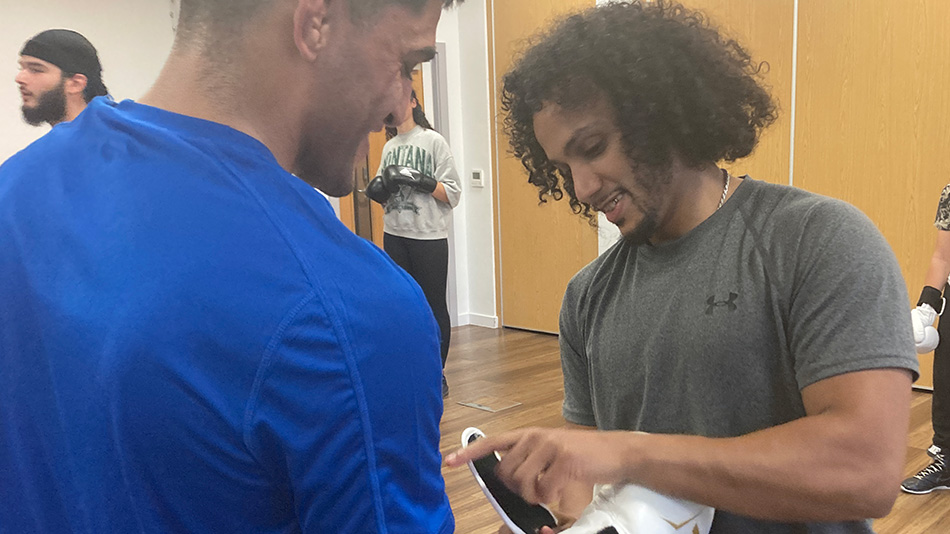
Wasem says Tiger Bay ABC, “is not specifically for Yemenis, it’s not a Yemeni boxing gym and it’s never been, and will never be a Yemeni boxing gym, it’s a diverse boxing gym that’s filled with 15 different diversities from all different backgrounds.”
British-Yemenis are no strangers to the world of boxing, the Yafei brothers from Birmingham and Kid Galahad hailing from Liverpool are just some of the names the community boasts. However, Prince Naseem took the boxing world by storm in the 90’s and early 2000s, winning three featherweight world titles, his influence is not lost on Wasem.
“When you see a successful guy from the same peninsula as yourself who is British Yemeni he probably motivated …the younger Yemeni generation to become boxers and to exceed in their ability to box and to further themselves in that field,” says Wasem.
He feels Yemenis have a strong reputation in the sport, “Yemenis have always been…known for their speed and their technique and their footwork,” he jokes, “I think it’s because they’re skinny and short they can’t be touched.”
Tiger Bay ABC, however, is more than simply a gym, says Wasem. He believes that it instils a concept of community within the members who train there. “It builds a sense of belonging, that sense of ownership, that sense of home, that sense of responsibility, and it breeds in young age, to take… responsibility and to feel like they are here for the community not just to better themselves but to better our community,” says Wasem.
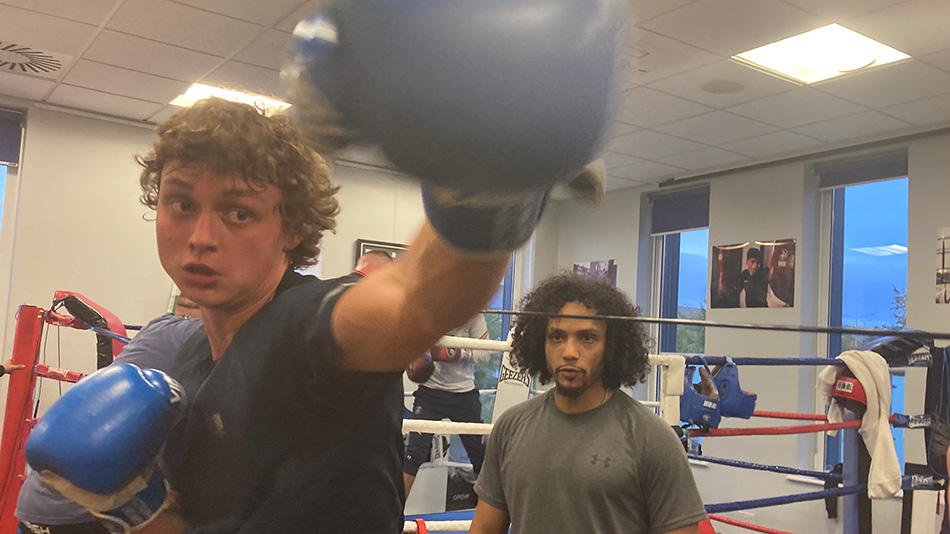
The Butetown community faces a number of challenges, in 2019 it was named as the area of Cardiff with the worst child poverty rates. Reggie also sees challenges for the youth in the Pillgwenlly area of Newport, which was given the third highest crime rate of the city according to the Gwent Police.
The lack of opportunities and high crime rate can be seductive to the youth of the area, according to Reggie. He feels that elements such as an ‘open drugs market’ can draw young people in, leaving them vulnerable.
“Living in an area of poverty is what you call a dangerous cocktail, because they’re easy to recruit, you have the school to prison pipeline, unfortunately, because the opportunities are not there,” Reggie says. “So therefore, if the opportunities are not there, kids try and find something to belong to.”
The NYCA sports clubs and GCSE catch-up classes are designed with providing the opportunities the community may otherwise be lacking.
Just to have a little social time with their friends. Yeah, I think it does bring the community together, definitely makes it stronger,”
Asaad Moshin
However, despite its similar reputation with Pillgwennly, Wasem does not see Butetown as lacking in opportunity, on the contrary, he feels the area has a lot to offer, with a rich range of cuisines and shops but also in providing a future for the young generation: “I hate using the word deprived, these are not deprived areas, it’s about hope, once you open the doors and give hope for the young generation,” says Wasem.
By providing organisations such as sports teams, Wasem feels that this enriches the community on multiple levels, he understands the power that all local sports clubs have in the area, not just boxing.
“People are doing it from their hearts and the soul. And to keep that control in a positive way, It’s great results for everybody, everyone’s a winner,” says Wasem. “It’s necessary for them to have these types of facilities and these type of services in these types of areas. Because it’s a home to them. It’s not just a club. It’s more than a club.”
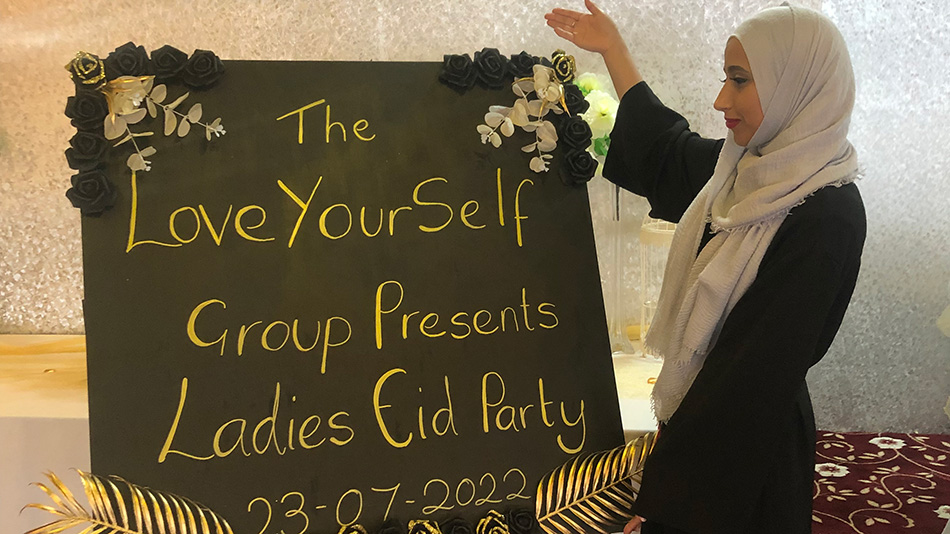
During the COVID-19 pandemic, both Reggie and Wasem mobilised the youth members of their organisation to deliver food packages to the local community. In addition, like the NYCA and Tiger Bay ABC, other community organisations such as ‘Love Yourself’ took the crisis as an opportunity to build a sense of community togetherness.
Love yourself, a women’s group in Butetown, found that lockdowns and isolation became an opportunity for its members to communicate and share small moments of humour and connection between each other.
Asaad Moshin, the group’s founder and a Welsh-Yemeni resident of Butetown says, “We would just… have that little moment where we just spoke to each other, or just send the messages to each other or a joke. I think it kept us sane and stronger,” Asaad says. “We would also if someone needed help, whether someone was isolating… some would do the shopping for them or cook for them. So, it does actually make us stronger as a group.”
Love Yourself was created to give women in the area, who may often be stay-at-home mothers, the opportunity to socialise and connect. Despite its simplicity Asaad believes these groups are incredibly important to the community, “It brings them Together, I think and then they just come just to have some relaxing time, just to have a little social time with their friends. Yeah, I think it does bring the community together, definitely makes it stronger,” she says.
Asaad is also clear that the Yemeni aspect of the group stays with her as an individual. ‘Love Yourself ‘is a group designed for the wider community, especially those who live in Butetown, and is open to all nationalities.
Despite this, she also appreciates organisations such as the SWIC and events such as cultural day. She feels it is important for the Yemeni community to continue to celebrate its culture, especially in times where the connection to Yemen becomes tenuous, as she says it is now during the on-going civil war.
The challenges that are faced abroad can also be exacerbated by a lack of understanding of local communities, according to Asaad. This is where she feels, like Daoud, that the British-Yemeni community is very effective at paving their own path to successful organisations.
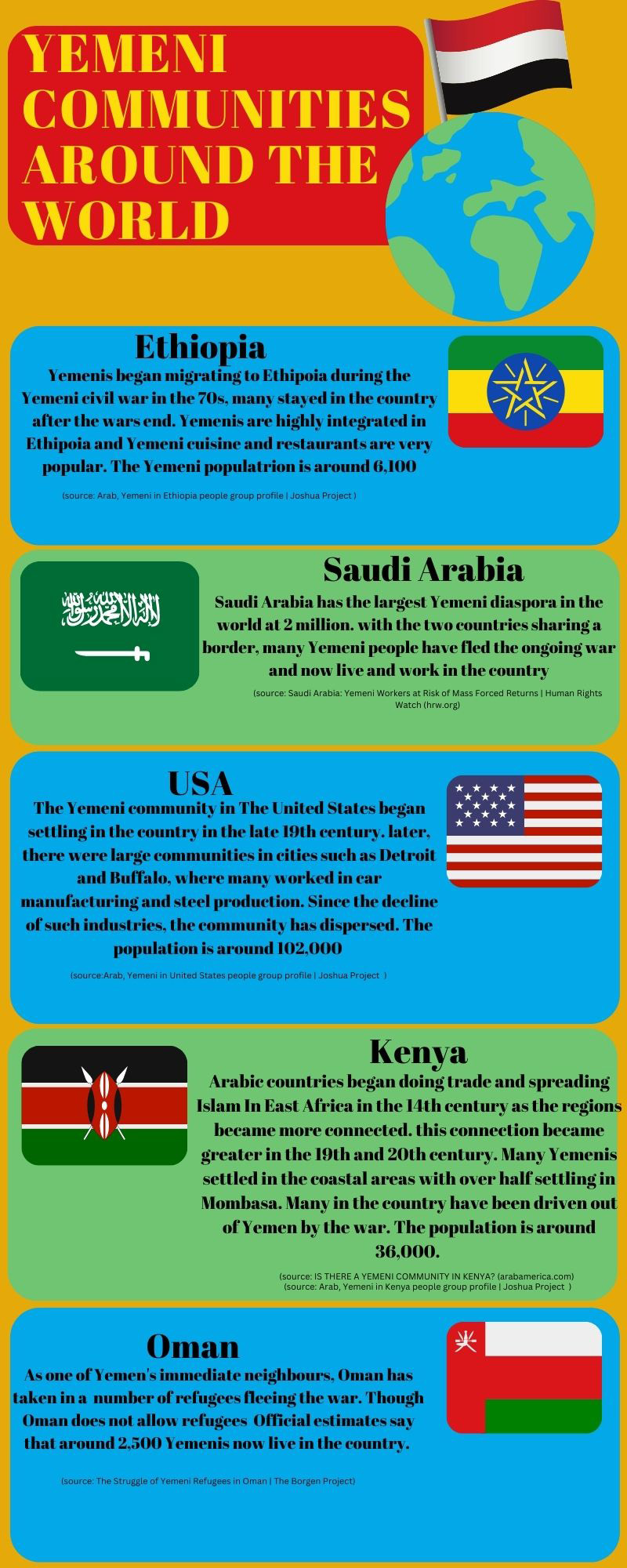
“I found a lot of people come to our community who aren’t from our community, especially [the] Yemeni community, and who tried to set up groups, tried to do things for us, but they don’t know what we want,” says Asaad. “They don’t understand because they don’t live in our community. So that’s why I think a lot of us in in the Yemeni community have just said, we’ll just do it ourselves.”
The Welsh-Yemeni identity has become a larger part of a wider community. While there are events and groups that have the Yemeni name and celebrate the Yemeni culture, the community seems to have built itself into the foundations of wider Welsh society.
As the music rang out across the rugby pitch and the children boisterously played on the bouncy castle, at the Newport Yemeni-Welsh festival, despite the Yemeni flags around the field, Reggie knew this had reached not just those who shared his heritage, but also a community of neighbours and friends.
The future aim of the festival is cemented and clear, when Reggie says, “We just wanted to sort of say, look, there’s enough going on in the world, we want to bring communities together. And we want to show that there’s a beautiful side to every community.”
